| Beech
Trees In The Netherlands |
Friday, January 06,
2006 |
| Jeroen Philippona |
|
Will,
Here some information about the now former
tallest beeches of the Netherlands.
Before I wrote you the tallest
beech in an alley at the estate of Middachten near Arnhem
was measured up to 48,5 m (159,12 feet).
Alas the oldest part of this alley including
this tallest individual was cut last November 2005, because the
owner thought it very dangerous: two beeches of the alley had
fallen spontaneous because of being hollowed out by a fungus,
several of the beeches were hollow as well. Here some pictures
of the trees some years before and some days after
cutting.

Beukenlaan Middachten-1-150
|
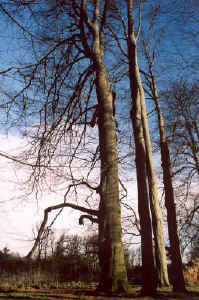
Beukenlaan Middachten-5a
|

Beukenlaan Middachten-3-100
|
When I came there the tallest of the beeches
had been removed already. The neighboring tree was the largest
of all (cbh 495 cm / 16.24 feet) and was still lying (see photo
with me beside it), so I could measure its length: 44.25 meter /
145.177 feet. Standing it was perhaps somewhat less high. The
tallest tree (cbh only 295 cm / 9.68 feet) had been about two
meter taller. The forester told me he had measured it while
standing just before cutting by clinometer as 46 meter / 150.9
feet), so his measurement seemed better than that of Leo
Goudzwaard by Digital Vertex Hypsometer. Alas he did not measure
it after the cutting.
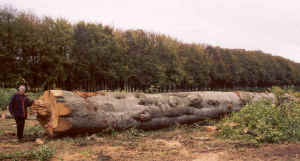
Middachten grote beuk gekapt |
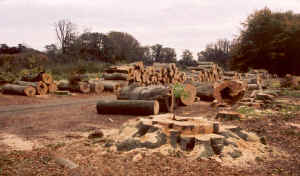
Middachten oprij gekapt |
Nearby there are still tall beeches standing,
but probably not taller than 44 m / 145 feet.
So I think this will be about the maximum
height European beech can get in the Netherlands, but also think
that the heights of 160 feet given elsewhere in Europe (Germany,
France, former Yugo-Slavia, Roumania) are reliable.
Jeroen Philippona
|
| Re:
Beech
Trees In The Netherlands |
Friday
Jan 06, 2006 |
| Will
Blozan |
| Jeroen,
Many, many thanks for the photos and report. I
would like to post it to the ENTS site with your permission. How
utterly sad that they were cut! What a gorgeous grove- I love
the photo of the people walking in the distance. Do you know
when they were planted? Is the wood worth anything?
Yes, the Digital Vertex Hypsometer would have
greatly overestimated the height. Your ground measurement is
likely representative of the height of the grove in general.
Someday I hope to see the great European trees. Fagus sylvatica
crushes the growth of our native F. grandifolia, even here in
the US. Our beeches rarely even reach 40 meters tall.
Will
|
| Re:
Beech Trees In The Netherlands |
Sunday, January 08, 2006 |
| Jeroen
Philippona |
Will,
Of course you have my permission. Indeed it was very sad this alley was cut,
there had been protest but because it is the main entrance to an important
castle, because of the danger of more trees falling, the protest was
overruled. The former owner, a count, called the alley his
beech-cemetery
and wanted to let it die naturally, but he died himself five years ago.
Since then his son wanted to cut the trees, what the forester had advised
already for a long time. They had to get permission by the government and
had to wait till research had been done if the trees were important for bats
and owls. In October report came out that there was no significant
colony of
bats and also no nests of owls and permission was given to cut the trees.
Some of them, among which the largest, were nearly totally sound and without
hollow. I forgot to tell you that I counted the rings: the tree was somewhat
over 230 years. According to information given by the estate and the
forester, the alley indeed was planted with young trees in 1776. On the same
estate some oaks (Q. robur) were planted in 1715 and 1733. They are less
tall, the tallest being between 110 and 120 feet.
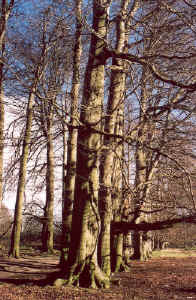
Beukenlaan Middachten-6 |
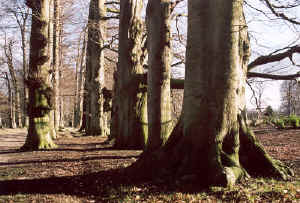
Beukenlaan Middachten-7a |
I don't think the wood was very valuable, because the majority of the trees
were hollow, with rotten wood. The trees which were sound perhaps had wood of
good quality, but in this area there has been a lot of fighting in the
second world war, what gave granate-scarfs in the wood.
Jeroen Philippona
|
|